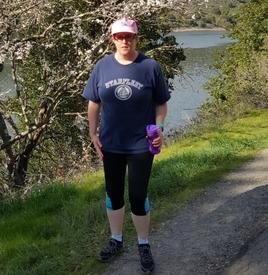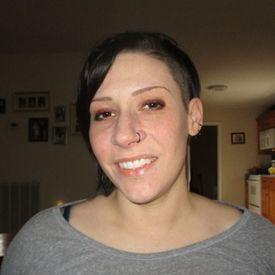Look at this article! Anybody think they are OCD on weightloss/fitness/calorie counting???

Leka1000
Posts: 160 Member
http://www.msn.com/en-ca/health/weightloss/20-signs-youre-too-obsessed-with-your-weight/ss-BBpkauz
This article actually mentions MyFitnessPal.....
I know I am guilty of MANY of these things.....unfortunately....
This article actually mentions MyFitnessPal.....
I know I am guilty of MANY of these things.....unfortunately....
0
Replies
-
I can see some of what they're saying, but I think doing those things doesn't necessarily mean you have unhealthy behaviors or thought processes associated to them.0
-
I had some negative presuppositions of the article, but I actually found it quite reasonable. The only real debatable ones are a matter of context. For instance - I do weigh myself daily, on multiple scales, even. But I'm able to emotionally detach myself from the number. The only number I really hold onto is my once-a-week weigh in, and even that, I'll take in stride if my week has been particularly wonky for some reason.
Also, the "counting every calorie" entry - I think there are a lot of people on MFP who have found a good way to straddle logging and not being "OCD" about it. For instance, those of us who use MFP, weigh and log everything, learn what decent portions look like and then taper the logging off. I'll go through periods without logging, but I'll keep weighing in. If my weight goes up again, stays the same for a long time, or if I feel that I need to remind myself what a decent portion looks like, I'll come back and start again.
There are also those that are super, super close to goal, or are trying to gain LBM by eating up to their maintenance every day. For those two groups, every calorie does count a little more. They probably should be weighing and logging everything.0 -
Some of these are reasonable, methinks. Others are 100% unmitigated BS.
Like this, for example. It starts with clickbait, but as you read it the true meaning becomes clear and they back away from the sensational headline.Journaling meals and snacks is a good way to avoid mindless munching, but at the same time it discourages intuitive eating, so you begin choosing foods based solely on their caloric value, ignoring important vitamins and nutrients and your own sense of satisfaction. "There's a fine line between calorie counting and the thoughts, feelings, and behaviors associated with an eating disorder," Rosenfeld says. "If you already struggle with regulating your eating habits or thoughts, it's a good idea to lift your focus off calories." To eat healthfully without obsessing, focus on filling half your plate with veggies and whole fruits, one-quarter with lean protein like chicken or fish, and one-quarter with a whole grain, like quinoa or brown rice.
A good rule of thumb for me is when you see ", Ph.D." following an author's name, ignore the book or the piece. I've got a PhD, I work with several people who have them. None of us ever use the title except in jest.
0 -
Some of these are reasonable, methinks. Others are 100% unmitigated BS.
Like this, for example. It starts with clickbait, but as you read it the true meaning becomes clear and they back away from the sensational headline.Journaling meals and snacks is a good way to avoid mindless munching, but at the same time it discourages intuitive eating, so you begin choosing foods based solely on their caloric value, ignoring important vitamins and nutrients and your own sense of satisfaction. "There's a fine line between calorie counting and the thoughts, feelings, and behaviors associated with an eating disorder," Rosenfeld says. "If you already struggle with regulating your eating habits or thoughts, it's a good idea to lift your focus off calories." To eat healthfully without obsessing, focus on filling half your plate with veggies and whole fruits, one-quarter with lean protein like chicken or fish, and one-quarter with a whole grain, like quinoa or brown rice.
A good rule of thumb for me is when you see ", Ph.D." following an author's name, ignore the book or the piece. I've got a PhD, I work with several people who have them. None of us ever use the title except in jest.
I don't know, I think that's still arguable.
Logging and journaling is great, don't get me wrong. But I interpret the author as saying, "if you have deeper issues with food, logging isn't going to cure them." And that's absolutely true. Logging is an awesome tool for granting context and teaching people what good nutrition and decent calorie portions actually look like - and it might be a great way for emotional eaters to "check themselves" before a binge. However, if you're dealing with body dismorphia or eating disorders, it's not going to fix that.
And - I don't know about anyone else - but I don't see myself carrying around a food scale for the rest of my life and pulling out a journaling app when I'm 80. I'm here to learn and lose, but I've always made it a goal that I'm going to learn enough to stop obsessing about food someday and just eat like a norm.0 -
The article ruffled my fur a bit.
1) Pushing that book from amazon, while going on about obsessiveness.
2) Because they've been looking through my windows.
A few things in the article made me cringe, but there was some good points throughout.0 -
A good rule of thumb for me is when you see ", Ph.D." following an author's name, ignore the book or the piece. I've got a PhD, I work with several people who have them. None of us ever use the title except in jest.
My former boss used his quite often to get into one of the better restaurants in town, "Yes, this is Doctor 'x', from Stanford. I'd like a table for two tonight." And they ALWAYS gave him a table.
0 -
I'm always thinking
1. Context. Weighing daily is not in itself obsessive; what you do with the information the scale provides, can be unhealthy.
2. What are they selling. Oh, a book.
3. False dilemmas. Awareness of calories does not mean lack of attention to nutrients.
4. The pot calling the kettle black - next article: "30 Fascinating Weight Loss Tricks You Haven't Tried"
5. Yeah right.
0 -
http://www.msn.com/en-ca/health/weightloss/20-signs-youre-too-obsessed-with-your-weight/ss-BBpkauz
This article actually mentions MyFitnessPal.....
I know I am guilty of MANY of these things.....unfortunately....
I actually have OCD, and when I first started using MFP, I could see the potential for getting too obsessed with it. Since OCD can manifest in many ways, and when one anxiety is gone, your brain will basically find something else to worry about, what the obsession is specifically is usually not relevant. If I wasn't properly medicated, I can easily see this becoming an obsessive focus. I have actually read things that suggest that eating disorders and OCD are closely related, which makes sense if you think about it because often eating disorders are not actually about food/fat.0 -
http://www.msn.com/en-ca/health/weightloss/20-signs-youre-too-obsessed-with-your-weight/ss-BBpkauz
This article actually mentions MyFitnessPal.....
I know I am guilty of MANY of these things.....unfortunately....
That site is clickbait
Everything is made up lists and page turns to get to next made up factoid
I found most of it stupid but gave up after 5 clicks0 -
http://www.msn.com/en-ca/health/weightloss/20-signs-youre-too-obsessed-with-your-weight/ss-BBpkauz
This article actually mentions MyFitnessPal.....
I know I am guilty of MANY of these things.....unfortunately....
That site is clickbait
Everything is made up lists and page turns to get to next made up factoid
I found most of it stupid but gave up after 5 clicks
I refuse to look at articles in slide format.0 -
I do not think there are always hard and fast rules. It is like saying, if you don't want to be an alcoholic, never have a drink. While it would work, it ignores the fact that many people who drink socially never develop an unhealthy relationship with alcohol.
My experience has been different. Calorie counting, either in the WW point system, or on MFP encouraged me to get my micro and macro nutrients. I ignored them when I was not weighing and logging. I am much more mindful about getting my requirements within my calorie limit. Tracking my exercise has not decreased my enjoyment. I weigh daily and do not suffer negative feelings, and I feel gives me a realistic view of sustainable weight loss.0 -
kshama2001 wrote: »http://www.msn.com/en-ca/health/weightloss/20-signs-youre-too-obsessed-with-your-weight/ss-BBpkauz
This article actually mentions MyFitnessPal.....
I know I am guilty of MANY of these things.....unfortunately....
That site is clickbait
Everything is made up lists and page turns to get to next made up factoid
I found most of it stupid but gave up after 5 clicks
I refuse to look at articles in slide format.
Me too! Incredibly irritating.0 -
daniwilford wrote: »Calorie counting, either in the WW point system, or on MFP encouraged me to get my micro and macro nutrients. I ignored them when I was not weighing and logging. I am much more mindful about getting my requirements within my calorie limit . . . I weigh daily and do not suffer negative feelings, and I feel gives me a realistic view of sustainable weight loss.
This is how I feel too. Before I found MFP, I lost 21 pounds over several months. I was starving the entire time, felt deprived, and, only after using MFP for a while and paying attention to macros did I realize the incredible amount of sodium I was ingesting, and how very little protein I was also getting. Meeting my macros every day is just as important to me now as meeting my calorie goals, and I could not do that without logging. Logging and weighing/measuring are tools I use, just like I use other tools in my life, and, since my weight loss is mostly about my health, they are pretty important tools in my arsenal.
0 -
Please note that the article didn't say that logging food, exercise, etc. is bad in itself; it says that it is bad if it takes over your life. If logging in becomes something that makes you unhappy, then it's a problem.0
-
alienredqueen wrote: »I actually have OCD, and when I first started using MFP, I could see the potential for getting too obsessed with it. Since OCD can manifest in many ways, and when one anxiety is gone, your brain will basically find something else to worry about, what the obsession is specifically is usually not relevant. If I wasn't properly medicated, I can easily see this becoming an obsessive focus. I have actually read things that suggest that eating disorders and OCD are closely related, which makes sense if you think about it because often eating disorders are not actually about food/fat.
You have an excellent sense of self and your limitations. This is awesome.0 -
I am not diagnosed with anything but T1 diabetes. I constantly check my body and compare other ladies to mine. When I log food, I focus so much time and effort that I could be doing other things. If I eat out fast food - I feel like a fat loser afterwards. I will buy candy and chips because I screwed my day up anyways. If my blood sugar goes high for no reason, i get pissed off and eat carbs (high blood sugars make you crave carbs btw) I feel like a loser after I do this too. Every time I go to the washroom, I look at my belly and flatten it out with my hands. If I miss a scheduled exercise, I feel like a failure. If I get a low blood sugar and have to eat I get pissed off because im having to eat and don't want too...If i have a unhealthy food meal, I will only eat salad or greek yogurt for the next meal. OR sometimes I give up for 2 days and binge. I have been known to avoid functions due to the food that might be there....sigh!!! But then there are some days that Im very positive! Blood sugars are great, therefore good food control happens, I WANT to exercise, I HAVE energy and Im good to go
 BUTTTTT this doesn't stick around for long....Diabetes is a huge B*TCH to me. ANYTHING from taking 1 extra stride during exercise can effect my blood, or I got sad...equals high blood sugar...I got mad, high blood sugar...I tried a different food and insulin reacted differntly to it and I got low THEN over ate cuz I was so low and therefore afterwards got high....Im stressed just talking about this...oh my!!! 0
BUTTTTT this doesn't stick around for long....Diabetes is a huge B*TCH to me. ANYTHING from taking 1 extra stride during exercise can effect my blood, or I got sad...equals high blood sugar...I got mad, high blood sugar...I tried a different food and insulin reacted differntly to it and I got low THEN over ate cuz I was so low and therefore afterwards got high....Im stressed just talking about this...oh my!!! 0 -
Not the first time random strangers have diagnosed me with an ED and/or disordered eating. Many of those people are also on MFP.0
-
-
"Journaling meals and snacks is a good way to avoid mindless munching, but at the same time it discourages intuitive eating, so you begin choosing foods based solely on their caloric value, ignoring important vitamins and nutrients and your own sense of satisfaction."
I don't find this to be true for me at all. I don't choose foods based on caloric value. I mean, OK, as a vegetarian in the South, eating at chain restaurants (because that's all there are in my area), I might choose salad X with appetizer Y or salad Z with appetizer W instead of some massive pizza because of calories, and so one of those healthier combinations gets its protein from cheese and nuts and the other from beans, but that is one meal a week, tops.
I still eat the same lunches and breakfasts and dinners I did before counting calories, I now just add exercise to make up the difference, have fewer snacks (which were usually not so good for me in the first place based on past choices), or have smaller portion sizes. Or skip the cheese dip side and just eat my burrito. Etc.
Yeah, I do try to get 10,000 on my Fitbit every day. But I get points from my health insurance company for that. (The points can be exchanged for gift cards at stores where I would shop anyway.) I was doing that even when I wasn't trying to lose weight. I got $300 worth of Amazon gift cards one year from doing that. Had nothing at all to do with health (even though I guess it was supposed to...).
Finished the slide show, next one that auto-loaded was "30 Fascinating Weight Loss Tricks You Haven't Tried." Which recommends garcinia cambogia even after a sentence offering only anecdotal support. And which then suggests that NOT eating organic could be derailing weight loss efforts after the first slide show suggests only eating organic is a sign of OCD or something. Sigh.0 -
DanyellMcGinnis wrote: »"Journaling meals and snacks is a good way to avoid mindless munching, but at the same time it discourages intuitive eating, so you begin choosing foods based solely on their caloric value, ignoring important vitamins and nutrients and your own sense of satisfaction."
I don't find this to be true for me at all. I don't choose foods based on caloric value. I mean, OK, as a vegetarian in the South, eating at chain restaurants (because that's all there are in my area), I might choose salad X with appetizer Y or salad Z with appetizer W instead of some massive pizza because of calories, and so one of those healthier combinations gets its protein from cheese and nuts and the other from beans, but that is one meal a week, tops.
I still eat the same lunches and breakfasts and dinners I did before counting calories, I now just add exercise to make up the difference, have fewer snacks (which were usually not so good for me in the first place based on past choices), or have smaller portion sizes. Or skip the cheese dip side and just eat my burrito. Etc.
Yeah, I do try to get 10,000 on my Fitbit every day. But I get points from my health insurance company for that. (The points can be exchanged for gift cards at stores where I would shop anyway.) I was doing that even when I wasn't trying to lose weight. I got $300 worth of Amazon gift cards one year from doing that. Had nothing at all to do with health (even though I guess it was supposed to...).
Finished the slide show, next one that auto-loaded was "30 Fascinating Weight Loss Tricks You Haven't Tried." Which recommends garcinia cambogia even after a sentence offering only anecdotal support. And which then suggests that NOT eating organic could be derailing weight loss efforts after the first slide show suggests only eating organic is a sign of OCD or something. Sigh.
Yep. I don't get why people go for this intuitive eating thing. First of all, aren't we here because our eating intuition was damaged enough to get overweight in the first place? I don't trust my eating intuition. When I trusted it the first time, I got fat. Heeeeelllllllooooooo? Some people, like myself, simply do not have that switch in their brain that says "Okay, you've got us all the fuel we need you can stop now". My husband totally has this switch, he's only hungry if he's hungry, be dammed what delicious noms he's surrounded by at the time. I do not. He can intuitive eat. I can't. The whole intuitive eating nonsense has been applied all wrong to the weight loss argument. It's a catch 22. If you can eat intuitively, you don't need to lose weight. Because you never gained it! Your brain told you to stop. If you can't eat intuitively, thus needing to lose weight, you certainly can't lose the weight (drumroll) eating intuitively! (applies to many, not all people)
And more importantly, what what what, in the wide word of all things rational and sane, makes people think calorie counting isn't intuitive? Do you stop eating breakfast, something you've done for decades, because you're calorie counting? Did everyone suddenly decide you HAVE TO eat 1420 calories every single day, exactly, or else? What isn't intuitive about saying "eat when you're hungry" and "don't eat if you're not hungry"? What isn't intuitive about saying "you do not have to eat a strict set of foods" or "on a special schedule" or "you don't have to be perfect every day, these are numbers you look at in the long term"? I just don't get all the hype about intuitive eating. If that was the answer, we'd all be like my husband, unable to get fat in the first place.0 -
This doesn't 100% apply to me, but I know for a fact that I have an OCD issue when it comes to macro tracking/the gym. I refuse to take rest days even when I'm in pain and obsess over calories. It's an issue I'm working on improving, slowly but surely. On the bright side, on gym days, my house-oriented OCD isn't quite as bad because I'm so completely exhausted.0
-
Well, some people like data. Some people obsess over data. It's not up to me to figure out which people are doing which things. I can think of many examples where some people are simply creatures of habit, and it helps them with their goals. Getting on the scale is one of those things it seems. Some people weigh daily but don't get worked up about the number.
I log more to keep an eye on my minimums, or any weird patterns. I really don't care if I go over calories or under, as long as I'm within a reasonably healthy overall window for what I'm doing. But by nature I'm not really OCD over anything.0 -
CoffeeNCardio wrote: »DanyellMcGinnis wrote: »"Journaling meals and snacks is a good way to avoid mindless munching, but at the same time it discourages intuitive eating, so you begin choosing foods based solely on their caloric value, ignoring important vitamins and nutrients and your own sense of satisfaction."
I don't find this to be true for me at all. I don't choose foods based on caloric value. I mean, OK, as a vegetarian in the South, eating at chain restaurants (because that's all there are in my area), I might choose salad X with appetizer Y or salad Z with appetizer W instead of some massive pizza because of calories, and so one of those healthier combinations gets its protein from cheese and nuts and the other from beans, but that is one meal a week, tops.
I still eat the same lunches and breakfasts and dinners I did before counting calories, I now just add exercise to make up the difference, have fewer snacks (which were usually not so good for me in the first place based on past choices), or have smaller portion sizes. Or skip the cheese dip side and just eat my burrito. Etc.
Yeah, I do try to get 10,000 on my Fitbit every day. But I get points from my health insurance company for that. (The points can be exchanged for gift cards at stores where I would shop anyway.) I was doing that even when I wasn't trying to lose weight. I got $300 worth of Amazon gift cards one year from doing that. Had nothing at all to do with health (even though I guess it was supposed to...).
Finished the slide show, next one that auto-loaded was "30 Fascinating Weight Loss Tricks You Haven't Tried." Which recommends garcinia cambogia even after a sentence offering only anecdotal support. And which then suggests that NOT eating organic could be derailing weight loss efforts after the first slide show suggests only eating organic is a sign of OCD or something. Sigh.
Yep. I don't get why people go for this intuitive eating thing. First of all, aren't we here because our eating intuition was damaged enough to get overweight in the first place? I don't trust my eating intuition. When I trusted it the first time, I got fat. Heeeeelllllllooooooo? Some people, like myself, simply do not have that switch in their brain that says "Okay, you've got us all the fuel we need you can stop now". My husband totally has this switch, he's only hungry if he's hungry, be dammed what delicious noms he's surrounded by at the time. I do not. He can intuitive eat. I can't. The whole intuitive eating nonsense has been applied all wrong to the weight loss argument. It's a catch 22. If you can eat intuitively, you don't need to lose weight. Because you never gained it! Your brain told you to stop. If you can't eat intuitively, thus needing to lose weight, you certainly can't lose the weight (drumroll) eating intuitively! (applies to many, not all people)
And more importantly, what what what, in the wide word of all things rational and sane, makes people think calorie counting isn't intuitive? Do you stop eating breakfast, something you've done for decades, because you're calorie counting? Did everyone suddenly decide you HAVE TO eat 1420 calories every single day, exactly, or else? What isn't intuitive about saying "eat when you're hungry" and "don't eat if you're not hungry"? What isn't intuitive about saying "you do not have to eat a strict set of foods" or "on a special schedule" or "you don't have to be perfect every day, these are numbers you look at in the long term"? I just don't get all the hype about intuitive eating. If that was the answer, we'd all be like my husband, unable to get fat in the first place.
Hahaha, nice post!
Yep, intuitive eating only works when it doesn't completely fail.
It's an Appeal to Nature fallacy, glorifying the lack of the use of information and facts.
If I use MFP to count calories, I'm using a darn sight more intelligence than just guessing portions, which could leave me massively over in calories (and it did) or extremely under in calories (as has also happened).
Intuition, shmintuition. How about Science and Technology for the win!0
This discussion has been closed.
Categories
- All Categories
- 1.4M Health, Wellness and Goals
- 397K Introduce Yourself
- 44.2K Getting Started
- 260.9K Health and Weight Loss
- 176.3K Food and Nutrition
- 47.6K Recipes
- 232.8K Fitness and Exercise
- 456 Sleep, Mindfulness and Overall Wellness
- 6.5K Goal: Maintaining Weight
- 8.7K Goal: Gaining Weight and Body Building
- 153.3K Motivation and Support
- 8.3K Challenges
- 1.3K Debate Club
- 96.5K Chit-Chat
- 2.6K Fun and Games
- 4.5K MyFitnessPal Information
- 16 News and Announcements
- 18 MyFitnessPal Academy
- 1.4K Feature Suggestions and Ideas
- 3.1K MyFitnessPal Tech Support Questions
















